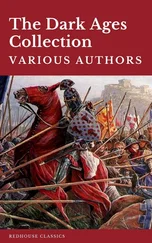Theodosius had studious tastes, and he formed a remarkable collection of theological books, 17but he was also interested in natural science including astronomy. He was of a gentle and kindly nature, and it is recorded that he was reluctant to inflict capital punishment. 18He seems to have possessed none of the qualities of a capable ruler either in peace or war. 19
To an unprejudiced observer in the reign of Arcadius it might have seemed that the Empire in its eastern parts was doomed to a speedy decline. One possessed of the insight of Synesius might have thought it impossible that it could last for eight hundred years more when he considered the threatening masses of barbarians who encompassed it, the oppression of the subjects, and all the evils which Synesius actually pointed out. The beginning of the fifth century was a critical time for the whole Empire. At the end of the same period we find that while the western half had been found wanting in the day of its trial, the eastern half had weathered the storm; we find strong and prudent Emperors ruling at New Rome. The improvement began in the reign of Theodosius. The truth is that this Emperor, though weak like his father, was far more intelligent, and had profited more by his education. Throughout the greater part of his reign the guidance of affairs seems to have been in the hands of prudent ministers who maintained the traditions of Anthemius and Aurelian. In the chronicles we do not hear much about the Senate; everything is attributed to Pulcheria or Theodosius. But it seems probable that the Senate exercised considerable influence on the policy of the rulers. The State was not threatened in this reign by the danger of a military dictatorship, and it was only towards its close that an unworthy eunuch enjoyed undue political power.
Soon after her accession to the responsibilities of government the young Empress was called upon to deal with serious troubles which had arisen in Egypt. The old capitals, Alexandria and Antioch, although they had been overshadowed by the greatness of Byzantium, were far from degenerating into mere provincial towns. They retained much of their old importance and all their old characteristics. In Alexandria, in the fifth century, with its population of perhaps 600,000 citizens, 20life was as busy, as various, and as interesting as ever. The Romans had found no city in the Empire so difficult to govern as that of the quick-witted and quick-tempered Alexandrians; the streets were continually the scene of tumults between citizens and soldiers, and revolts against the Augustal Prefects. “While in Antioch, as a rule, the matter did not go beyond sarcasm, the Alexandrian rabble took on the slightest pretext to stones and cudgels. In street uproar, says an authority, himself Alexandrian, the Egyptians are before all others; the smallest spark suffices here to kindle a tumult. On account of neglected visits, on account of the confiscation of spoiled provisions, on account of exclusion from a bathing establishment, on account of a dispute between the slave of an Alexandrian of rank and the Roman foot-soldier as to the value or non-value of their respective slippers, the legions were under the necessity of charging among the citizens of Alexandria.” 21
Instead of healing the discords and calming the intractable temper of this turbulent metropolis by diffusing a spirit of amity and long-suffering, Christianity only gave the citizens new things to quarrel about, new causes for tumult, new formulae and catchwords which they could use as pretexts for violence and rioting.
The troubles which agitated Alexandria, when Pulcheria became regent, were principally due to the bigotry and ambition of the Patriarch. In this office, Theophilus, whom we met as the enemy of Chrysostom, had been succeeded (A.D. 412) by his nephew Cyril, who was no less ambitious to elevate the prestige of his see and was even more unscrupulous in the arts of intrigue. In the first years of his pontificate his chief objects were to exalt his own authority above that of the civil governor of Egypt, the Augustal Prefect, and to make Alexandria an irreproachably Christian city by extirpating paganism which still flourished in its schools, and by persecuting the Jews who for centuries had formed a large minority of the population. He was an ecclesiastical tyrant of the most repulsive type, and the unfortunate Hypatia was the most illustrious of his victims.
Hypatia was the daughter of Theon, a distinguished mathematician, 22who was a professor at the Museum or university of Alexandria. Trained in mathematics by her father, she left that pure air for the deeper and more agitating study of metaphysics, and probably became acquainted with the older Neoplatonism of Plotinus 23which, in the Alexandrian Museum, had been transmitted untainted by the later developments of Porphyrius and Iamblichus. When she had completed her education she was appointed to the chair of philosophy, and her extraordinary talents, combined with her beauty, made her a centre of interest in the cultivated circles at Alexandria, and drew to her lecture-room crowds of admirers. Her free and unembarrassed intercourse with educated men and the publicity of her life must have given rise to many scandals and backbitings, and her own sex doubtless looked upon her with suspicion, and called her masculine and immodest. She used to walk in the streets in her academical gown (τρίβων, the philosopher’s cloak) and explain to all who wished to learn, difficulties in Plato or Aristotle. 24Of the influence of her personality on her pupils we have still a record in some letters of Synesius of Cyrene, who, although his studies under her auspices did not hinder him from adopting Christianity, always remained at heart a semi-pagan, and was devotedly attached to his instructress. That some of her pupils fell in love with her is not surprising, 25but Hypatia never married.
The cause of the tragic fate, which befell her in March A.D. 415, is veiled in obscurity. We know that she was an intimate friend of the pagan Orestes, the Prefect of Egypt; and she was an object of hatred to Cyril, both because she was an enthusiastic preacher of pagan doctrines and because she was the Prefect’s friend.
The hatred of the Jews for the Patriarch brought the strained relations between Cyril and Orestes to a crisis. On one occasion, seeing a notorious creature of Cyril present in an assembly, they cried out that the spy should be arrested, and Orestes gratified them by inflicting public chastisement on him. The menaces which Cyril, enraged by this act, fulminated against the Jews led to a bloody vengeance on the Christian population. A report was spread at night that the great church was on fire, and when the Christians flocked to the spot the Jews surrounded and massacred them. Cyril replied to this horror by banishing all Hebrews from the city and allowing the Christians to plunder their property, a proceeding which was quite beyond the Patriarch’s rights, and was a direct and insulting interference with the authority of Orestes, who immediately wrote a complaint to Constantinople. At this juncture 500 monks of Nitria, sniffing the savour of blood and bigotry from afar, hastened to the scene. These fanatics insulted Orestes publicly, one of them hitting him with a stone; in fact the governor ran a serious risk of his life. 26The culprit who hurled the missile was executed, and Cyril treated his body as the remains of a martyr.
It was then that Hypatia fell victim in the midst of these infuriated passions. One day as she was returning home she was seized by a band of parabalani 27or lay brethren, whose duty it was to tend the sick and who were under the supervision of the Patriarch. These fanatics, led by a certain Peter, dragged her to a church and, tearing off her garments, hewed her in pieces and burned the fragments of her body. 28The reason alleged in public for this atrocity was that she hindered a reconciliation between Orestes and Cyril; but the true motive, as Socrates tells us, was envy. This ecclesiastical historian does not conceal his opinion that Cyril was morally responsible.
Читать дальше












